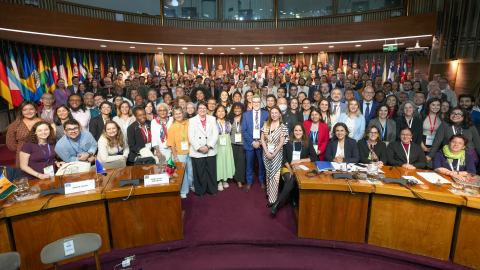Briefing note
The use of diverse economic and fiscal instruments such as green taxes, subsidies, charges for waste disposal and emissions certificates to coordinate development objectives with the fight against climate change impacts in the region were the topics addressed during an international seminar held on Monday, September 7, at the headquarters of ECLAC in Santiago, Chile.
Experts and academics from numerous countries attended the gathering on Climate Change and Environmental Taxation in Latin America and the Caribbean, organized by the Economic Commission for Latin America and the Caribbean (ECLAC) in conjunction with German cooperation.
The seminar was inaugurated by Jürgen Klenk, the main advisor to the ECLAC-BMZ/GIZ Cooperation Program, and Joseluis Samaniego, Director of ECLAC’s Sustainable Development and Human Settlements Division.
In his welcome remarks, Jürgen Klenk emphasized that the State has various instruments to correct the negative environmental impacts stemming from economic development, which makes the link between fiscal policy and climate change ever more relevant.
“The inclusion of fiscal tools in environmental policy is an issue that is already present in the public discussion, but it is a continuous process and requires a constant effort in order to contribute to sustainable and inclusive development,” Klenk said.
Meanwhile, Joseluis Samaniego underscored the need to find points in common between taxation and environmental policies. He said this explains the relevance of meetings such as this one, where participants can share experiences, debate cases and reflect upon the direction that development should take.
“We must advance towards the key provision of public goods for countries, which are the paths of action in the face of climate change-related losses (…) For example, strengthening public services is crucial. Managing water and solid waste well and bolstering public transportation are mitigation policies that have high levels of social inclusion,” said Samaniego, who added that it is also important to identify inclusive options for adaptation measures.
At the seminar experts discussed the use of economic and fiscal instruments to achieve compliance with the Intended Nationally Determined Contributions (INDC) that each country must present with a view to the agreement expected to be reached during the Conference of the Parties (COP21) of the United Nations Framework Convention on Climate Change, which will take place in Paris in December.
In addition, along with presenting experiences regarding the application of these tools in the region’s countries, officials launched the Climate Change, Environmental Taxation and Economic Instruments Network, the objective of which is to establish a mechanism of constant contact between specialists to exchange information on these practices and other environmental challenges.
The Climate Change and Environmental Taxation international seminar is part of a series of activities organized by ECLAC during the week of September 7-11 to reflect upon climate change.


